Welcome to Keeping the Receipts— a newsletter from the Citizens, written this week by Carole Cadwalladr and Kyle Taylor. You can read about the mission behind this here.
If you like what you see, consider forwarding it to a friend or two. Or to support our mission, please consider signing up to the paid version.
This week we’re turning our focus to our US-based project. There have been so many profound and unprecedented news events in the last year, but few more shocking than January 6th, 2021, when the world looked on as a mob of protestors stormed the US Capitol.
The events of that day were relived in detail last week when police officers gave powerful testimonies about what they experienced at the first congressional hearing on the insurrection. If you missed it, this shocking new footage was released last week showing the incredible bravery of officers such as Daniel Hodges:
Nearly a year ago we launched an emergency project in the US because this was exactly what we feared would happen. We called it the Real Facebook Oversight Board and at our first press conference Larry Tribe, the then Carl M. Loeb Professor at Harvard Law School and one of the most eminent constitutional scholars in the US, said we were “watching a coup d’etat in progress”.

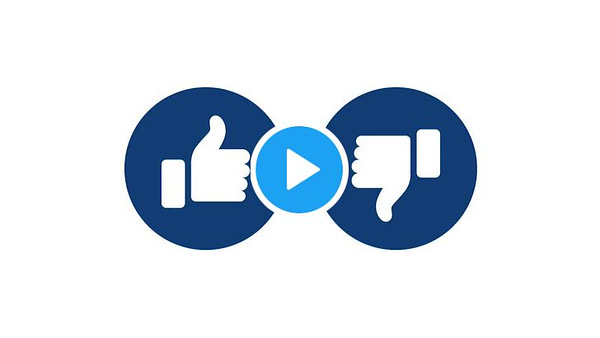
And as it turned out, we were. What we feared would happen did happen. And Facebook, as we’d also feared, was right at the heart of it.
What happened on January 6th was an attempted coup. It was incited by Donald Trump across social media platforms – including Facebook – and for several hours it seemed that the future of American democracy hung in the balance.
Facebook enabled Trump and others to spread misinformation and incite violence. Its algorithms drove eyeballs to fake news and inflammatory content. And the insurgents openly recruited and organised in Facebook groups. The US had an extraordinarily lucky escape. But more than six months on, Facebook still operates with absolute impunity.
The Real Facebook Oversight Board was the second major project that the Citizens launched. We pulled it together in a matter of weeks because academics, civil society groups, journalists and activists could all see that Donald Trump was using Facebook to subvert the democratic process. He spread baseless allegations of voter fraud and encouraged white supremacist groups – but there was nothing that anyone could do. And Facebook refused to take even basic steps to protect the vote.
Our role – inspired by our work with Independent SAGE – was to bring these different experts together. We formed a broad coalition of leaders of some of the most important civil rights groups in America – NAACP, Color of Change, the Anti-Defamation League, Muslim Advocates and Free Press – with leading tech scholars, critics, activists and journalists. Academics like Shoshana Zuboff, a professor emerita at Harvard University and the author of Surveillance Capitalism, and Safiya Noble, an associate professor at UCLA and the author of Algorithms of Oppression. And critics like Roger McNamee, one of Facebook’s original investors, and Maria Ressa, the inspirational journalist facing jail for cyber libel in the Philippines.
These were groups and individuals with radically different ideas about both the problems and solutions, but together we agreed on three demands that we put to Facebook. On the day we launched, Facebook agreed to the first of these – banning ads seeking to delegitimise the US election – and a week later it conceded the second of them. You can read more about the Real Facebook Oversight Board in this report by Sue Halpern in the New Yorker.
Our mission at the Citizens is to find new ways to hold power to account. The absolute lack of consequences for Facebook over its role in the Cambridge Analytica scandal, despite record-breaking fines, helped inspire us. And that lack of consequences is still playing out today.
Below, Kyle Taylor, our project lead for the Real Facebook Oversight Board, describes the latest action we took this week - and explains why this is still one of the most urgent issues facing the world today. At the Citizens, we believe you can’t fix any of the other crises we’re facing – including COVID-19 and the climate crisis – unless you fix the information crisis first.
Body Bags at Dawn (Or How Disinformation on Facebook is Killing People & What We’re Trying to Do About It)
On 16 July, US President Joe Biden was asked by a reporter what his message to platforms like Facebook was. “They’re killing people,” he said.

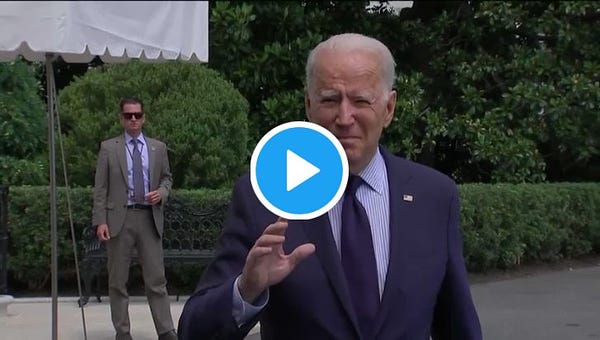
It was a dramatic escalation in a war of words between the White House and the social media company. But with good reason.
In March of this year the Center for Countering Digital Hate published a report revealing that just 12 accounts on Facebook were responsible for more than two thirds of all COVID-19 disinformation. It called them the “disinformation dozen.” Last month, new life was breathed into the report when the US Surgeon General made clear that vaccine misinformation and disinformation was a “serious public threat”.
It was a major landmark in official recognition of the threat that disinformation poses. Because this isn’t an “online” problem. It has serious, urgent real-world impacts too. And in the US – and across the world – COVID-19 anti-vax conspiracy theories are causing huge harm to public health. A study published in the American Journal of Tropical Medicine and Hygiene, for example, found that approximately 800 people died following a popular myth that consumption of highly concentrated alcohol could disinfect the body and kill the virus. The study specifically mentions Facebook and other social media companies as the main places where this misinformation is consumed.
Facebook’s response was not to take action against the accounts (The Center for Countering Digital Hate said in April that ten of the twelve were still active on the platform). Instead, it launched a tirade against Joe Biden saying they would “not be distracted by accusations”.
Last Wednesday, Facebook published its quarterly earnings report for its shareholders. This revealed that profits had doubled and that revenue had increased 56%. In order to highlight the hidden costs that this entailed, the Real Facebook Oversight Board launched a new project: a Quarterly Harms Report. We commissioned research to analyse and calculate Facebook’s harms during this same earnings period.
We released this last week ahead of Facebook’s financial report: a stark message to shareholders of the true value of their investment.

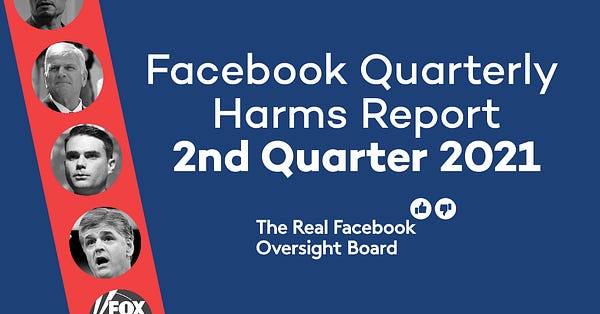
Our research and analysis lays out Facebook’s serious problem with disinformation hosted on their platform - and their active choice not to act on it. New York Times reporter and tech columnist Kevin Roose has been compiling the Top Ten posts on Facebook by US pages almost every weekday using CrowdTangle, a Facebook-owned data analytics tool. We aggregated all available data for the second quarter of 2021 and the results were shocking:

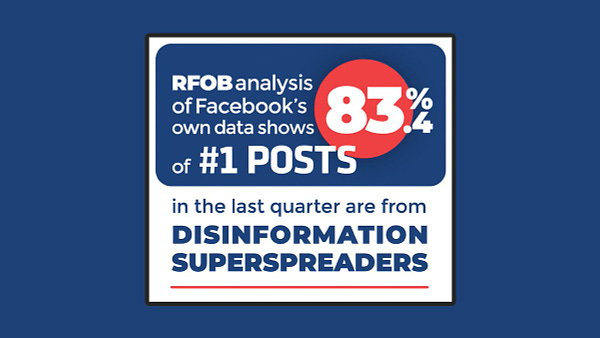

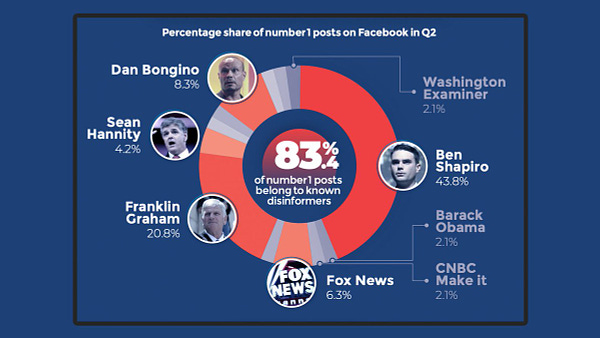
But how to make people care? There have been so many reports. What would make shareholders and investors actually think about the impact Facebook is having on the world? Even condemnation from the President of the US has failed to make it address its deadly disinformation problem.
Working with a group of activist artists, we brought the issue directly to Facebook’s door on Wednesday by placing body bags with “Facebook Disinfo Kills” toe tags outside its DC headquarters.

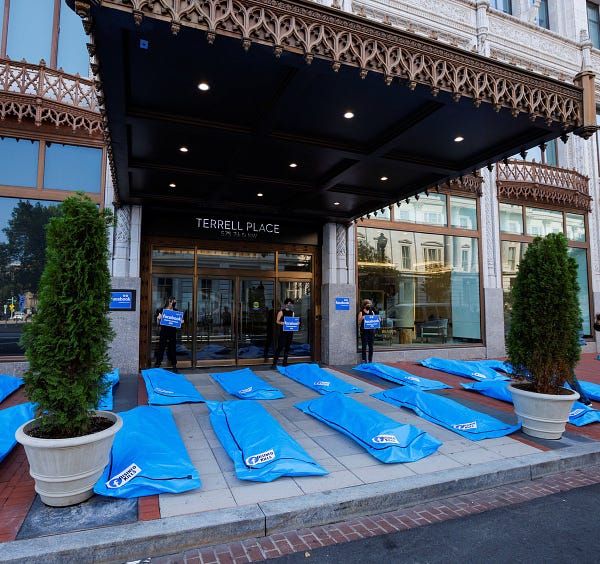
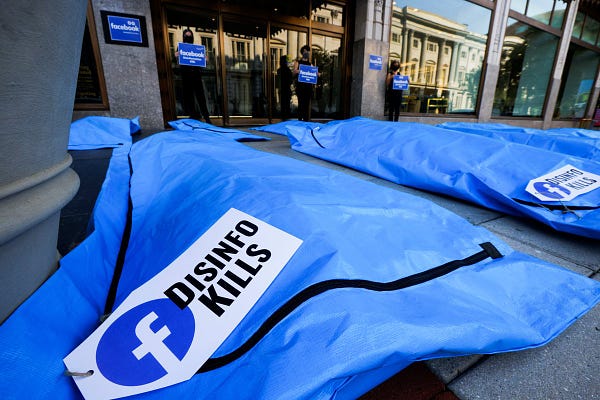
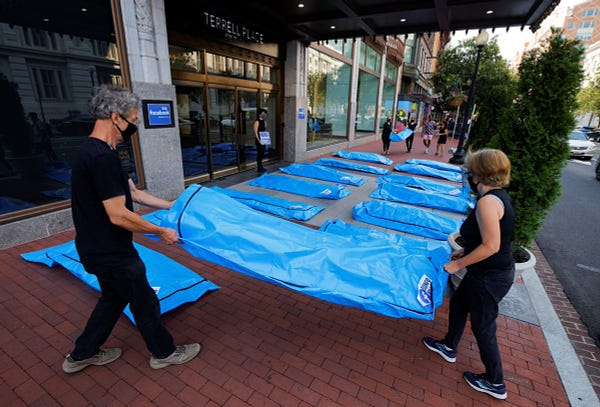

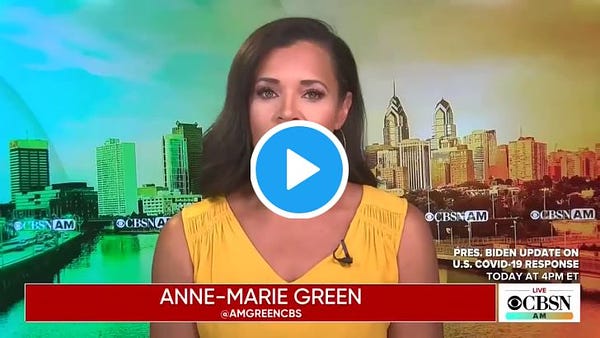
This is an important visual representation of the damning impact Facebook has had on society. And it worked. The report was covered by The Guardian, CBS News and The Hill as well as more than a dozen other outlets. It was also cited in The Wall Street Journal’s report on Facebook’s earnings.
What we need is massive systemic change through statutory legislation, yet there are things that Facebook could do right now - at no cost - but is simply choosing not to. These are easy fixes:
Disable post engagement on proven disinformation superspreaders;
Uprank quality news sources by reprioritising reputability in the news algorithm.
The first means that Facebook users would not be able to like, comment or share posts that have been deemed disinformation, dampening the spread of harmful content. The second would ensure that more users are exposed to quality journalism, helping to get truthful information into people’s news feeds.
Facebook is now actively choosing not to address these issues. Our work for the next quarter is to put pressure on it, to force it to do so. It’s a matter of life and death.
Kyle Taylor





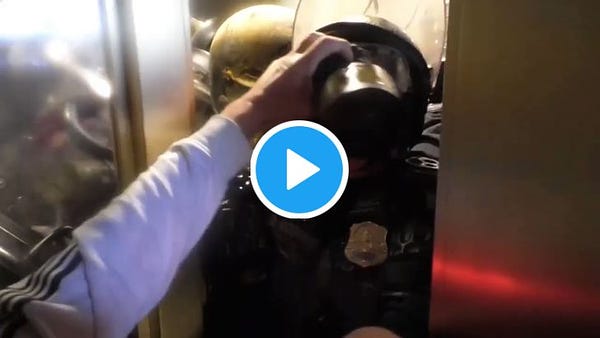
I think it might help to explain why Facebook chooses not to do anything on this. As I understand it, misinformation spreads faster than facts, creating more engagement and a stronger proposition for advertisers. The higher the level of engagement, the more money is spent on Facebook. And culturally, Facebook is all about growth. This is the case for other platforms too, like Twitter. Until the company adopts new metrics, or new ways of encouraging engagement, this will not change. Love what you guys are doing. Keep going!